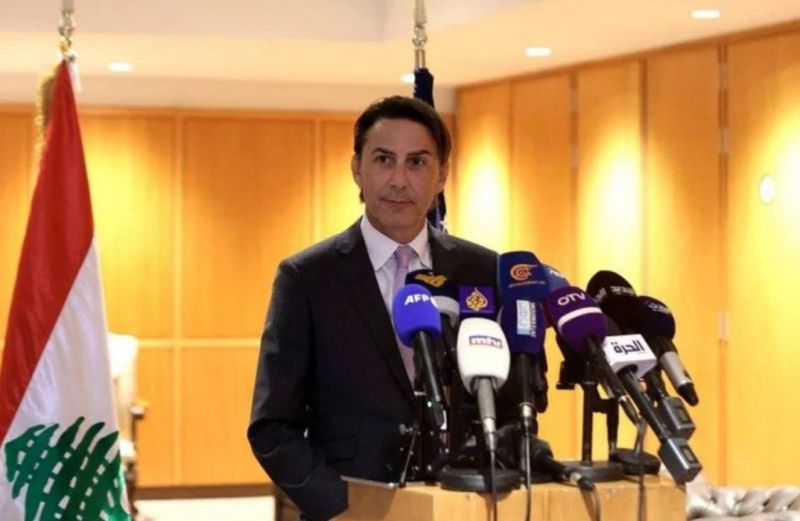
Hochstein during a press briefing at Beirut airport, August 2023. (Credit: AFP archives)
The US has taken the front seat in talks for de-escalation of the clashes between Israel-Hezbollah, which have been ongoing since Oct.8.
So far, President Joe Biden’s envoy to the Middle East, Amos Hochstein, has adopted a relatively conciliatory stance towards Iran’s Lebanese arm. He has called on Israel to calm things down to avoid all-out war and is negotiating a border demarcation agreement that Hezbollah is already presenting as a victory.
But following the drone strike on the Syrian-Jordanian border, which was attributed to Iran-aligned militias and left three US soldiers dead and 25 wounded the potential “deal” is likely complicated. This is because it seems difficult for the US administration to justify a policy of appeasement towards Iran, and even more so towards the Islamic Republic’s regional allies.
“We shall respond,” Biden told journalists on Sunday during a visit to South Carolina. The US president stressed Iran’s responsibility for the strike. However, it seems unlikely that the US’s response will take place within the Islamic Republic, as has been called for by the most extreme in Congress, given all the risks such a retaliation could entail.
The Biden administration could instead retaliate by targeting Iranian influence elsewhere in the Middle East. This could mean giving Netanyahu’s cabinet the green-light to carry out a large-scale military operation intended to weaken Hezbollah.
“During the July 2006 war, everything seemed to indicate that President George W. Bush’s administration was trying to win time by delaying the ceasefire agreement, to allow the Israelis to weaken Hezbollah as much as possible,” a Lebanese diplomatic source told L’Orient-Le Jour. Will this scenario be repeated?
“So far, the Biden administration’s approach has been to separate the regional tension with Iran from the situation in Lebanon,” said Middle East expert Joe Macaron. “It is therefore more likely for the [US] to adopt a defensive stance against Iran by responding in a limited way to Sunday’s attack while continuing to make efforts to ease tensions on [Lebanon’s] southern border.”
Indeed, the US seems to be against extending the Gaza war, which it desires a quick end to, for a variety of reasons.
‘The window is there’
Firstly, the way Biden handled the war has cost him precious points in the polls, just a few months ahead of the presidential election scheduled for November.
Secondly, it is becoming increasingly complicated for Washington to provide logistical and political support to both Israel and Ukraine, which has been at war with Russia for over two years.
This situation is made even more unbearable by the fact that, since Operation Al-Aqsa Flood, many actors, such as the Houthis in Yemen and Iran-backed factions in Iraq and Syria, have carried out attacks on US targets, endangering US interests in the region.
Washington seems to be in a rush to move on from Netanyahu, who will be difficult to dislodge amid war. Particularly, Netanyahu is blocking Biden’s attempts to revive the Israeli-Palestinian peace initiative, and thus to score a rare diplomatic victory in the Middle East.
It is unlikely that Hochstein will give up. Meanwhile, there are media claims that the Israel-Hamas negotiations are progressing, raising the prospect of a weeks-long truce.
This will likely have repercussions on South Lebanon and help facilitate Hochstein’s mission, since Lebanon, like Hezbollah, has made agreement with Israel conditional on a ceasefire in Gaza.
In an interview given on Sunday to the American CBS News channel, before the attack on the US base, Hochstein said he would soon be back in Lebanon to continue negotiations.
“The window for diplomacy is definitely there,” he said. “I don’t deny that the status quo of where we are now can’t last forever. And that is why we need to make sure that we can get to diplomatic resolution,” he added.
“We also have to make sure that Israelis and Lebanese can live in their homes with security. And that is not just a ceasefire, it requires a more intricate piece of the negotiations to ensure that the Lebanese Army is in that area, that there is more parameters of security for civilians. Once we do that, though, we do need to start looking at how do we mark the border, an actual border, between the two countries so.”
This article was originally published in French in L'Orient-Le Jour. Translation by Joelle El Khoury.